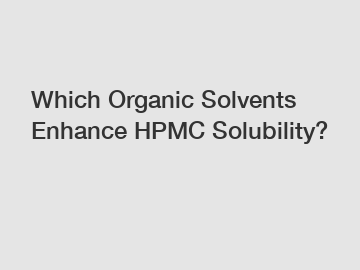Which Organic Solvents Enhance HPMC Solubility?
Which Organic Solvents Enhance HPMC Solubility?
If you've ever browsed the world of pharmaceuticals or studied the use of hydroxypropyl methylcellulose (HPMC) in the field, you may have come across the question of which organic solvents enhance its solubility. Today, we delve into this topic to shed some light on the subject and provide you with valuable insights.
HPMC, a cellulose ether widely used in drug delivery systems and other pharmaceutical applications, exhibits a degree of solubility in water. However, depending on the specific formulation, additional solvents may be necessary to achieve the desired solubility and enhance the overall performance of HPMC-based products.

Before we explore the organic solvents that enhance HPMC solubility, it's important to note that different grades of HPMC exhibit varying solubility characteristics. Furthermore, solvents can impact various properties of HPMC, such as viscosity, gelation temperature, and drug release rates. Therefore, careful consideration and evaluation of the specific requirements of your formulation are crucial.
1. Ethanol:
Ethanol is a commonly used organic solvent that strongly enhances HPMC solubility. Its ability to increase the solubility of HPMC is attributed to its polarity and hydrogen bonding potential, which allow it to interact with HPMC and disrupt its polymer structure. Ethanol is particularly effective when used in lower concentrations, as high concentrations may cause gelation or precipitation due to decreased polymer-solvent interactions.
2. Isopropanol:
Isopropanol, also known as isopropyl alcohol, is another organic solvent that improves HPMC solubility. Similar to ethanol, isopropanol is polar and forms hydrogen bonds with HPMC, leading to enhanced solubility. However, it should be noted that higher concentrations of isopropanol may adversely affect HPMC gelation temperature and viscosity.
3. Dimethyl Sulfoxide (DMSO):
DMSO is a highly polar and aprotic (lacks acidic hydrogen) solvent that has been widely investigated for its ability to enhance the solubility of various pharmaceutical compounds. Due to its excellent solvating properties, DMSO can significantly improve the solubility of HPMC, making it a choice solvent for HPMC-based formulations. However, its high toxicity and odor may limit its usage in certain applications.
4. Propylene Glycol:
Propylene glycol is a water-miscible solvent commonly employed in pharmaceuticals, cosmetics, and food applications. It can improve HPMC solubility, especially when used in combination with other organic solvents. Propylene glycol is considered safe for use and has a low toxicity profile, making it a suitable option in many HPMC formulations.
5. Polyethylene Glycol (PEG):
Various grades of polyethylene glycol (PEG) can be used as co-solvents to enhance HPMC solubility. PEG possesses high water solubility and can enhance the solubility of hydrophilic polymers like HPMC. The choice of PEG grade and concentration depends on the desired solubility, viscosity, and other properties.
6. Acetone:
Acetone, a highly polar and volatile organic solvent, has also been found to enhance HPMC solubility. Due to its low boiling point and rapid evaporation, acetone can be used for preparing HPMC solutions and removing residual solvents. However, its flammable nature and potential skin irritation should be considered during usage.
It's worth mentioning that solubility enhancement of HPMC may not always require additional organic solvents. Various techniques, such as particle size reduction, controlling pH, and temperature changes, can also influence HPMC solubility.
In conclusion, selecting the appropriate organic solvent(s) to enhance HPMC solubility is a crucial step in formulating HPMC-based products. Ethanol, isopropanol, DMSO, propylene glycol, PEG, and acetone are among the commonly used solvents in this regard. However, it is essential to consider the specific requirements of your formulation and evaluate the impact on HPMC's properties. Always adhere to safety guidelines and regulatory requirements when working with organic solvents.
Remember, understanding the solubility characteristics of HPMC and the compatibility of organic solvents with HPMC is vital for successful formulation development in the pharmaceutical industry. So, whether you're considering drug delivery systems, controlled-release formulations, or other applications, consider the solubility puzzle of HPMC and uncover the ideal organic solvents for your next formulation.
Are you interested in learning more about polypropylene fiber manufacturer, HPMC manufacturers, HPMC for dry mixed mortar? Contact us today to secure an expert consultation!
99
0
0


Comments
All Comments (0)